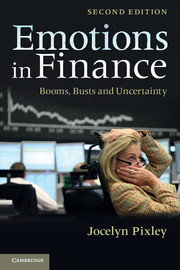Book contents
- Frontmatter
- Contents
- Acknowledgements
- Abbreviations
- Interviews
- Introduction
- 1 Modern money, modern conflicts
- 2 Corporate suspicion in the kingdom of rationality
- 3 Financial press as trust agencies
- 4 Required distrust and the onus of a bonus
- 5 Managing credibility in central banks
- 6 Hierarchies of distrust from trust to bust
- 7 Overwhelmed by numbers
- 8 The time-utopia in finance
- 9 Taming the god of opportunism
- References
- Index
9 - Taming the god of opportunism
Published online by Cambridge University Press: 05 June 2012
- Frontmatter
- Contents
- Acknowledgements
- Abbreviations
- Interviews
- Introduction
- 1 Modern money, modern conflicts
- 2 Corporate suspicion in the kingdom of rationality
- 3 Financial press as trust agencies
- 4 Required distrust and the onus of a bonus
- 5 Managing credibility in central banks
- 6 Hierarchies of distrust from trust to bust
- 7 Overwhelmed by numbers
- 8 The time-utopia in finance
- 9 Taming the god of opportunism
- References
- Index
Summary
There are no recipes in this brief conclusion. The logical conclusions to my argument are about the preferable emotions for coping with uncertainty. Taming the systemic opportunism, therefore, would start by looking carefully at impersonal trust. The Anglo-Saxon model is untrustworthy, so much so that more countervailing visions are joining my expert ‘sour voices’. Many argue that self-destruction is built into the pattern of boom to bust. That includes the entire ‘community’ more seriously each time, because seeking profits with guile is bound to destroy money's foundations in trust in the future, trust in productive industries, trust in governments and in populations. Finance only deals in promises; when the sector tries to sell them off, it destroys trust, which is the basis of money-production.
No one can reduce uncertainty or attempt to beat it. The world is incoherent and cannot be controlled. In facing the unknowable, emotions provide a way to stabilise uncertainties into routines and standardised procedures. Emotions are rational and unavoidable, but nothing can transform uncertainty into the risk of ‘known chances’ – which can also run huge losses. Some uncertainties may not matter much – will a slight rain fall on the way to work? A precautionary umbrella is the answer. But the uncertainty of money always involves vulnerabilities. No matter the emotional ‘investment’ let alone other expenditure, calculations are all of the past, and tomorrow may be very different from today.
- Type
- Chapter
- Information
- Emotions in FinanceBooms, Busts and Uncertainty, pp. 255 - 263Publisher: Cambridge University PressPrint publication year: 2012



